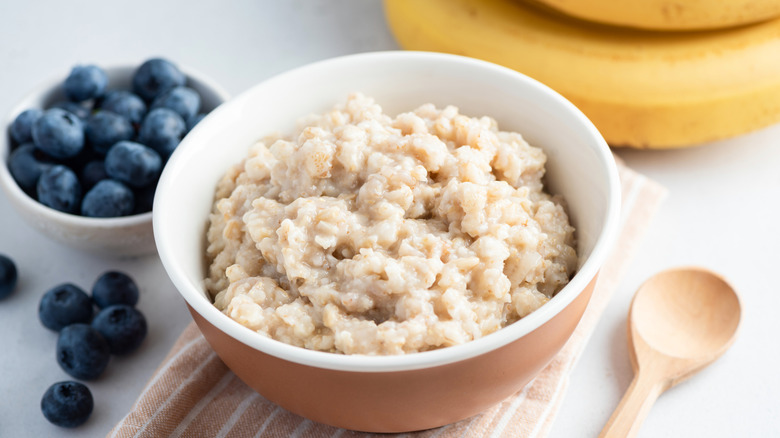These Are The Health Benefits Of Eating Oatmeal Every Day
A bowl of warm oatmeal is a delicious, filling way to start your day. Oatmeal isn't just tasty, though. It's very healthy and loaded with nutrients, offering many different potential health benefits, especially if you use it in recipes like our superfood overnight oats with kiwi, blueberries, and chia seeds. Even by itself, oatmeal is very nutritious, so if you're looking to eat healthy, this grain is a wonderful place to start.
While the exact numbers will vary depending on things like the type of oats in the bowl, on average, one cup of oatmeal contains eight grams of fiber and 12 grams of protein, as well as 6.5 grams of a highly beneficial form of soluble fiber known as beta-glucan. Oatmeal also has many necessary and beneficial nutrients like calcium, potassium, and zinc. Sure, it won't give your body absolutely everything it needs, but oatmeal is still a nutrient-dense food that fills you up and gives you plenty of energy.
Oatmeal and its various nutrients benefit the human body by helping lower cholesterol levels, reducing the risk of heart disease, and improving your blood sugar levels and insulin sensitivity (which puts you at reduced risk of developing type two diabetes). It can even potentially help you lose weight. That last claim is attributed to oatmeal's ability to slow down your metabolism, which makes you hungry less often, not because of any special fat-busting power.
Should you eat oatmeal every day?
If oatmeal is so healthy, should you start your days with a nutritious British-style oatmeal breakfast? You certainly can, in moderation. Many people eat oatmeal daily and see health benefits, but, for some, eating too much can have negative effects like bloating. You also shouldn't eat oatmeal exclusively, since, as we said, it doesn't contain all the nutrients your body needs. Oatmeal should be part of a balanced diet, not your whole diet.
In addition, it's important not to go overboard with toppings. Many people have oatmeal with fruit, brown sugar, or other add-ins, and most of them are delicious, with health benefits of their own. However, there can be too much of a good thing. Oatmeal already has no small amount of carbs, so introducing sugary foods like honey can potentially make your health food not so healthy. One of the great cooking tips for healthy oatmeal is to limit toppings to two or three things and to avoid refined sugars.
You also need to remember that everyone's bodies are different. You have unique dietary needs that may or may not line up with the benefits oatmeal has to offer. For example, if you already have a slow metabolism, slowing it further with a bowl of oatmeal may not be the best idea. Your doctor, along with perhaps a registered dietitian, can help you find out your body's specific dietary needs and build a diet around them.

